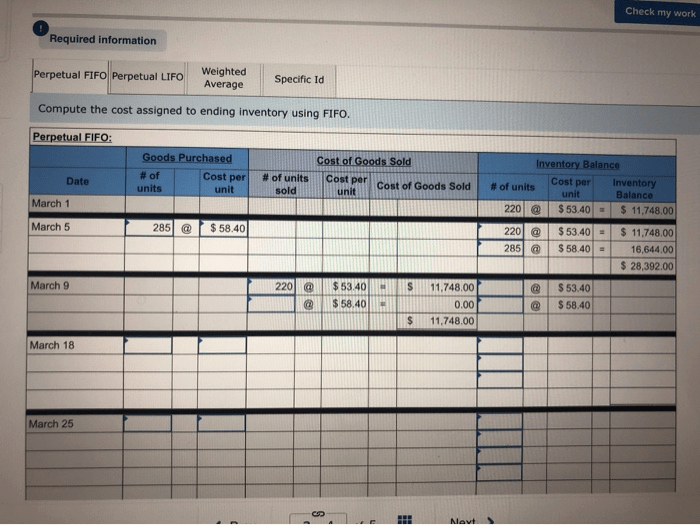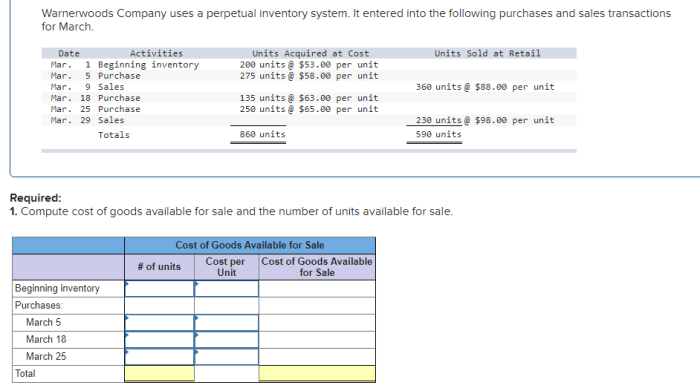Warnerwoods company uses a perpetual inventory – Warnerwoods Company, a leader in the industry, has embraced the perpetual inventory system, a sophisticated approach to inventory management that offers a myriad of advantages. This article will delve into the intricacies of Warnerwoods Company’s perpetual inventory system, exploring its components, benefits, and implications for financial reporting.
Perpetual inventory systems provide real-time visibility into inventory levels, enabling businesses to make informed decisions regarding stock replenishment, production planning, and customer fulfillment. Warnerwoods Company has successfully harnessed the power of this system to streamline its operations and enhance its overall efficiency.
Perpetual Inventory System

A perpetual inventory system is a method of inventory management that tracks the flow of goods in and out of a warehouse or store in real-time. This system provides businesses with up-to-date information on the quantity and value of their inventory, allowing them to make informed decisions about production, purchasing, and sales.
Perpetual inventory systems are typically used by businesses that have a high volume of inventory transactions or that need to maintain a high level of inventory accuracy. This system can be implemented using a variety of methods, including manual tracking, spreadsheets, or specialized inventory management software.
Advantages of Using a Perpetual Inventory System
- Real-time inventory visibility
- Improved inventory accuracy
- Reduced inventory shrinkage
- Enhanced customer service
- Improved financial reporting
Disadvantages of Using a Perpetual Inventory System, Warnerwoods company uses a perpetual inventory
- Increased cost and complexity
- Potential for errors
- Increased workload for inventory staff
Warnerwoods Company
Warnerwoods Company is a leading manufacturer and distributor of building materials. The company operates a large distribution center that stocks a wide variety of products, including lumber, hardware, and tools. Warnerwoods Company uses a perpetual inventory system to track its inventory in real-time.
The company’s perpetual inventory system is integrated with its accounting system, which allows Warnerwoods to automatically update its inventory records as products are received and shipped. This system provides Warnerwoods with up-to-date information on the quantity and value of its inventory, which allows the company to make informed decisions about production, purchasing, and sales.
Inventory Management: Warnerwoods Company Uses A Perpetual Inventory

Inventory management is the process of planning, organizing, and controlling the flow of goods in and out of a warehouse or store. The goal of inventory management is to maintain the optimal level of inventory to meet customer demand while minimizing costs.
The key components of inventory management include:
- Inventory planning
- Inventory control
- Inventory valuation
Inventory Valuation
Inventory valuation is the process of determining the value of a company’s inventory. The value of inventory is used to calculate the cost of goods sold and the gross profit.
There are a number of different methods of inventory valuation, including:
- First-in, first-out (FIFO)
- Last-in, first-out (LIFO)
- Weighted average cost
The choice of inventory valuation method can have a significant impact on a company’s financial statements.
Financial Reporting

Perpetual inventory systems impact financial reporting in a number of ways. First, the use of a perpetual inventory system results in more accurate inventory balances on the balance sheet. Second, the use of a perpetual inventory system allows companies to track the cost of goods sold more accurately, which results in more accurate income statements.
The following financial statements are affected by perpetual inventory systems:
- Balance sheet
- Income statement
- Statement of cash flows
Case Study
ABC Company is a small manufacturing company that implemented a perpetual inventory system in 2018. Prior to implementing the system, ABC Company had a difficult time managing its inventory levels. The company often had too much inventory on hand, which resulted in increased storage costs and obsolescence.
The company also had difficulty meeting customer demand, which resulted in lost sales.
Since implementing the perpetual inventory system, ABC Company has experienced a number of benefits, including:
- Reduced inventory levels
- Improved inventory accuracy
- Increased customer satisfaction
- Improved financial performance
Commonly Asked Questions
What is a perpetual inventory system?
A perpetual inventory system is a method of inventory management that continuously updates inventory records as transactions occur, providing real-time visibility into inventory levels.
What are the advantages of using a perpetual inventory system?
Advantages of using a perpetual inventory system include improved accuracy, reduced shrinkage, enhanced customer service, and better decision-making.
How does Warnerwoods Company use a perpetual inventory system?
Warnerwoods Company uses a perpetual inventory system to track inventory levels in real-time, enabling the company to optimize stock replenishment, production planning, and customer fulfillment.
